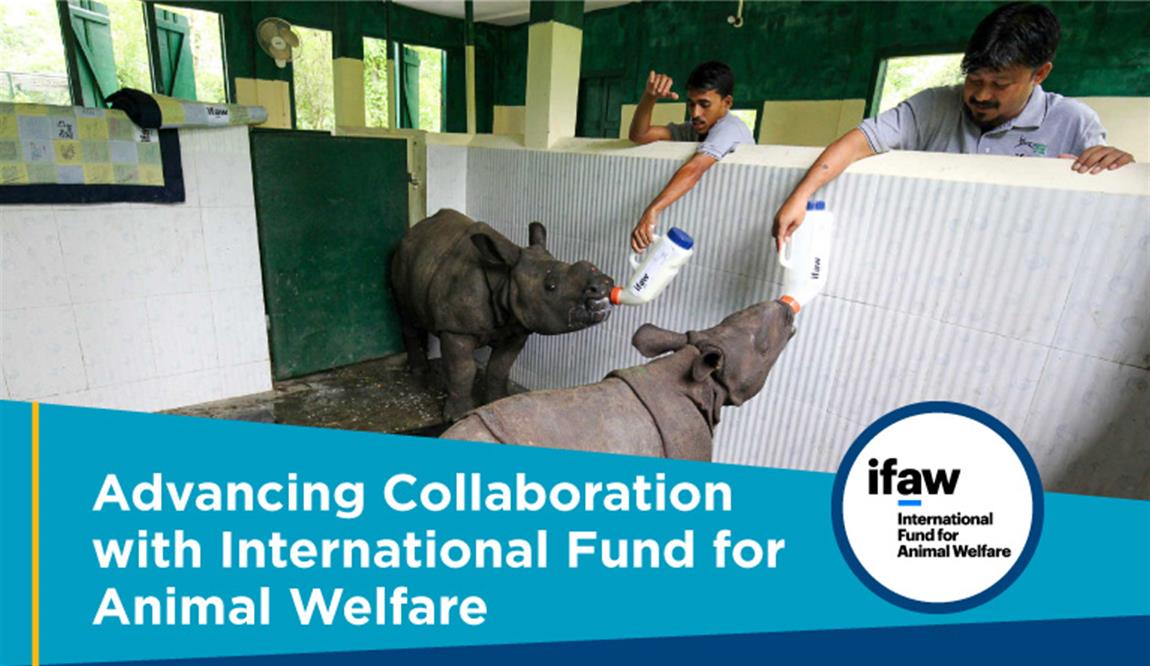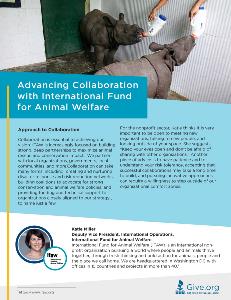
International Fund for Animal Welfare (IFAW) is an international nonprofit organization pursuing a world where people and animals thrive together, through fresh thinking and bold action for animals, people and the place we call home. We are headquartered in Washington, D.C., with offices in 15 countries and projects in more than 40.
Featured Guest
Katie Miller
Deputy Vice President,
International Operations
International Fund for Animal Welfare
Approach to Collaboration
Collaboration is
essential to achieving International Fund for Animal Welfare’s
(IFAW) vision. IFAW is increasingly focused on building strong, deep
partnerships to maximize animal rescue and conservation impact.
IFAW partners with local organizations, governments, local communities,
and more. Collaboration can take many forms. Examples include creating
and nurturing disaster response and risk reduction networks, building
coalitions to advocate for strong conservation and animal welfare
policies, and providing funding and technical support to organizations
closely aligned to its strategy, to name a few.
For the nonprofit sector, Katie thinks it is essential to be open to meeting new organizations, talking to new people, and looking outside of your space. She suggests, “Keep your eyes open and don’t be afraid of sharing with other organizations.” Another piece of advice is to have patience and to understand your risk tolerance, accepting successful collaborations may take a long time to build, and pursuing innovative approaches can require a willingness to step outside of organizational comfort zones.
Application of the 9 Considerations for Collaboration
Build Trust
Partnerships often start with personal relationships. For
this reason, it is vital to begin with building relationships to build
trust. To cultivate these relationships, spend time on the ground
listening to partners and stakeholders, to share and clarify
expectations, and to deliver on the commitments you make.
Have a Vision
IFAW envisions a world where animals and people thrive
together, and to move closer to that, it must keep an eye on the future.
We need to understand the changing dynamics of threats to animals,
whether those be from wildlife crime, human activities like shipping and
fishing, or consumer decisions. For example, climate change is a
big challenge that will undoubtedly result in more natural disasters and
change the availability of food and water, which affects both people and
wildlife. IFAW works with scientists and makes scientific contributions
itself to inform where to focus its energy and to pinpoint which types
of collaborations are most needed. IFAW also monitors political,
economic and social trends to identify the issues where collaborations
will be critical to influencing policy decisions and changing consumer
behavior.
Seek to Assure the Success of Collaborators
Capacity building is an important component of IFAW’s
approach. IFAW engages its disaster response networks in technical
trainings to build and maintain its animal rescue skills, and to ensure
its teams can train new members themselves. IFAW has conducted more than
5,000 trainings worldwide in the prevention of illegal wildlife trade
for wildlife rangers, customs and border officers in source, transit,
and consumer countries committed to reducing wildlife crime.
IFAW’s Community Engagement program utilizes participatory
approaches and technical expertise to help communities co-design and
implement solutions to animal-human conflict issues. IFAW also
provides funding and in-kind support to key partners to ensure they have
the tools needed to achieve shared outcomes. IFAW makes multi-year
commitments to large-scale projects to ensure its local partners can
sustain impact.
Take Stock
IFAW has found that careful consideration of the context
should drive collaboration decisions. With every project, IFAW strives
to clarify the gaps between the impact it seeks and what it can deliver
through its own expertise and capacity. IFAW looks for local partners
that not only have the technical expertise for the project at hand, but
also understand the situation, have close community ties, and are
trusted by the community. Ethical considerations are also critical when
choosing appropriate partners. While they do not have to agree on every
issue, partners do have to understand each other’s differences,
trust each other's organizational integrity, and have a shared
commitment to achieving the outcomes they'll work towards
together.
Start Small
Working together on concrete, time-limited projects can serve as the
foundation for more ambitious, longer-term collaborations. For example, IFAW leads a disaster response network in
Southeast Asia that started small and has grown over time. This network
began with people and organizations that worked together on specific
disaster responses and evolved into a more proactive network that
addresses preparedness and risk reduction so that the impacts of
disasters on animals and people are minimized. The same has happened
with IFAW’s conservation work in Africa. Projects working with
government wildlife agencies to reduce poaching in specific parks in
Malawi, Zambia, and Kenya have led to long-term, cross-boundary,
multi-stakeholder landscape protection projects that include funders,
local NGOs, and communities.
Fail Fast, and Build Rigorous Feedback Loops
Access to flexible funding has been essential for IFAW to respond
quickly where it’s needed, pioneer new approaches and
course-correct along the way. IFAW is grateful to its supporters
worldwide for making this possible. As expectations from funders
have increased to more rigorously document project monitoring and
evaluation, it has challenged IFAW in healthy ways and created new
opportunities to learn what works and why. Getting the balance right
between rigor and flexibility is something IFAW strives for. It is on a
journey of strengthening its adaptive management to maximize impact and
encourage funders and donors to foster this entrepreneurial approach of
taking risks, building feedback loops, and learning from what
doesn’t work and from what does.
Take a Portfolio Approach
IFAW’s tenBoma initiative in East Africa is deeply
rooted in a portfolio approach, based on building relationships with
diverse community stakeholders. This project uses intelligence-based
techniques and sophisticated data analysis to prevent poaching and
mitigate human-wildlife conflict. Regular and varied types of
intelligence about what is happening on the ground is the key to staying
one step ahead. The tenBoma team collaborates with a wide range of local
stakeholders, from Maasai elders, youth and women’s groups to
community scouts, Kenya Wildlife Service, and other agencies to gather,
analyze and share useful information to get ahead of poaching and
conflict.
Consider Non-Traditional Partners
IFAW looks for ways to collaborate with organizations who
have complementary strengths to its own and can magnify their
impacts. Maintaining long-term pro bono relationships with the
private sector has enabled IFAW to vastly increase the visibility of its
conservation and animal welfare messaging in Asia. IFAW works directly
with online commerce platforms, auction houses, and other companies
around the world to reduce illegal wildlife trade. It also collaborates
with entrepreneurs and social media influencers to reach new audiences
who are interested and invested in its work.
Keep Your Donors Apprised of Your Collaborations
Donor relationships and networks are very important and can
sometimes open doors to new sources of funding. IFAW has had funders of
its work promote projects to other funders in their network, which
contributes to sustainability and is a powerful testament to its
credibility. IFAW also finds that funders seek out IFAW due to the
strong collaborations it builds with local organizations and its ability
to increase the impact of their funds through these partnerships. Due to
its vast network of animal rescue collaborators and the trust IFAW has
built over time, IFAW assisted its largest private foundation funder in
identifying local, effective organizations that are most in need of
funding.
Future Collaborations
For animals and people to thrive in the future despite growing
environmental pressures, we have to find new and better ways to share
the planet. IFAW seeks to collaborate with organizations, companies,
governments, and communities that also care about animals, communities,
and the environment. It seeks collaborations to implement rescue and
conservation initiatives in Africa and Asia, to advocate for stronger
national and international policies, and to educate, motivate, and
engage new audiences to be part of the solution.
Photo credit: Subhamoy Bhattacharjee/WTI-IFAW



